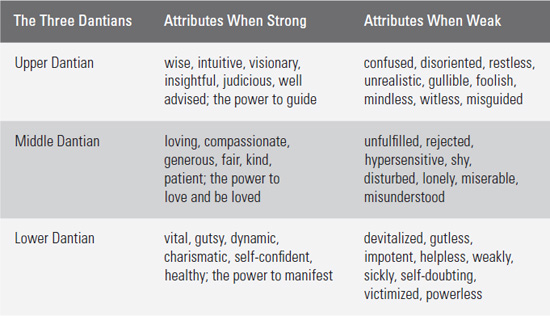
Balance and Integration
A Dantian Typology
After having empowered each of your Three Dantians, perhaps you noticed that one of them was easier to work with and one of them was harder to work with than the other two. Maybe by the time you completed the three empowerments, you felt the Love Qi in your Middle Dantian blazing like the sun, while the Wisdom Qi in your Upper Dantian only flickered like a candle caught in a draft. Or maybe your Lower Dantian roared like a lion while your Middle Dantian barely bleated like a lamb.
Granted, these dramatic examples are extreme and your experience was probably less pronounced than that. But most of us actually do possess a specific Dantian energy pattern based on the one Dantian that is relatively more developed than the other two, and the one that is relatively less developed. And even if the differences between your strongest and weakest Dantians are not breathtaking, any imbalance among them will still play out in your life in a significant way, especially during a time of crisis.
During the next phase of our journey, we’ll develop a dantian typology by systematically exploring six different lopsided dantian combinations. We will sketch out a profile for each one of the types and examine scenarios of the imbalances that are likely to emerge in each case. But first we’ll begin with a brief review of some of the positive and negative features associated with each of the Three Dantians.

Recall that a dantian is an energy center situated inside your body that acts as a reservoir of energy. A healthy dantian is like an abundant well from which you can draw water whenever you are thirsty. If you thirst for wisdom, you can draw on the refined mental energy stored in the Upper Dantian and become more intuitive, visionary, and insightful. If you thirst for love, you can draw on the pure emotional energy stored in the Middle Dantian and become more caring, sensitive, and generous. And if you thirst for vitality, you can draw on the raw potency stored in the Lower Dantian and become more gutsy, dynamic, and charismatic.
On the other hand, an unhealthy Dantian is like a dry well. When you thirst for its energy and draw on its paltry resources, you come up short. An unhealthy Upper Dantian dims your mental powers and leaves you feeling confused, disoriented, and gullible. An unhealthy Middle Dantian shuts off the flow of love and leaves you feeling lonely, rejected, and unfulfilled. And an unhealthy Lower Dantian disables your confidence and leaves you feeling impotent, helpless, and weak.
If you understand these three basic building blocks, you’ll be able to follow along as I map out a dantian typology. As I run through the six combinations, try to identify the type to which you belong and also see whether you can associate each of the other types with someone you know.
In the first dantian scenario we will examine Type 1, which consists of a strong Upper Dantian and a weak Middle Dantian.
Strong Upper Dantian and Weak Middle Dantian
A well-respected university professor falls secretly in love with one of his students. He is a bright, insightful man with a sharp wit, but his emotional side is grossly underdeveloped. He never learned to express his feelings growing up and fears his own vulnerability. Up to now he has never been able to actually express his love for a woman.
Every time he sees the object of his affection walk into the classroom, his heart races, and each time she leaves it shrivels up. All semester he longs to tell her how he feels, but he simply can’t. Each time he approaches her, his chest tightens and he gets all choked up. One day he sees her on campus holding hands with her boyfriend, and for the first time in his adult life, he cries.
After the semester ends, he realizes that he will probably never see her again. That night he ponders his solitary life and realizes that he has always been a lonely, unloved man. His emotional pain becomes intolerable. Suddenly life no longer seems worth living. He opens the window, steps out onto the ledge, and stands there for a long while as he seriously ponders whether or not he would be better off taking that step …
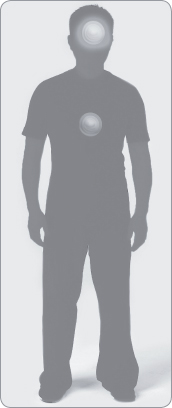
Strong Upper Dantian—intuitive, visionary, and insightful
Weak Middle Dantian—lonely, rejected, and unfulfilled
Characteristic: This person is wise but miserable.
Poets and songwriters have created their finest works on the simple premise that love makes life worth living, and that when we are denied that love our lives feel worthless. The professor in this scenario may well be a wise man with a distinguished career, but he is also a miserable man, as reflected by his constricted Middle Dantian and the emotional anguish it churns.
An ample supply of Upper Dantian energy may give him heaps of intuition, visionary brilliance, and insightfulness, but those qualities can’t make up for his inability to love and receive love. A clever mind can cover up the feelings of loneliness for only so long. Eventually the hole in the chest becomes too big for even the most cynical head to ignore.
The forsaken heart always catches up, one way or another, and its pain is unbearable. That is why our otherwise accomplished professor is still staring down from that ledge, deciding whether or not to jump.
In the next dantian scenario we will examine Type 2, which consists of a strong Upper Dantian and a weak Lower Dantian.
Type 2
Strong Upper Dantian and Weak Lower Dantian
A quiet, sheepish man is part of a group of business managers at a brainstorming session. All kinds of wild ideas are being tossed around, none of them really worth considering. The sheepish man is suddenly struck by a brilliant insight. But he “sits” on his inspired vision for a long time, unable to summon the confidence to break into the discussion and express his point of view. Finally he manages to share his idea with the group, but he describes it with such a meek, uninspired voice that no one pays any attention to him.
The discussion picks up steam again as a few other inane ideas are presented. About half an hour later, a charming, loud-mouthed woman repeats the exact same idea the man had—but she expresses herself confidently and underscores her self-assurance with assertive gestures. The group is mesmerized by her brilliant performance, and when she finishes they all congratulate her, including the sheepish man whose idea she “borrowed.”
Later, at his office, the sheepish man contemplates the day’s events. It’s not the first time other people have exploited his ideas. He angrily recalls the time his boss got all the credit for the innovative plan he had developed singlehandedly for another important project. This pattern of exploitation has gone on for years. It has held him back. If only he conducted himself more assertively, he would be much further along in his career. He decides that today will be the day he finally draws the line and ask for a much-deserved promotion and raise.
He walks over to his superior’s office and asks the secretary to let him see his boss right away. She seems surprised by his unusually assertive tone and asks him to wait a few minutes. As he does, he begins to second-guess himself. Nervous tension forms around his lower abdomen, and his hands become cold and sweaty. His legs grow feeble and his resolve weakens. Before long he feels completely impotent and excuses himself with characteristic sheepishness. He returns to his office and dutifully gets back to his work.
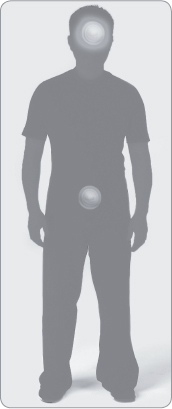
Strong Upper Dantian—intuitive, visionary, and insightful
Weak Lower Dantian—impotent, helpless, and weak
Characteristic: This person is wise but devitalized.
A well-developed Upper Dantian fills the mind with brilliant visions and endows us with forward-thinking insight, but a weak Lower Dantian robs us of the power to express that creative wisdom convincingly and stand up for ourselves. With this combination we can’t effectively push our wise inner knowledge out into the world effectively, or claim what we rightfully deserve.
Big head; no guts. If we fall into this category, we have a hard time engaging in life fully. We lack the power to manifest change, and eventually our self-esteem erodes. Despite our visionary intelligence, we settle for mediocrity and lackluster half measures. Fearing any kind of risk, we end up retreating from both opportunities and challenges and attract vultures, snakes, and sharks who milk our talents, just as we saw happen to our sheepish man.
In the next dantian scenario we will examine Type 3, which consists of a strong Middle Dantian and a weak Upper Dantian.
Strong Middle Dantian and Weak Upper Dantian
A young woman falls in love with a man who likes to drink, just like her previous boyfriend. Her best friend thinks he is unruly and disruptive and finds him unsettling, but the young woman shrugs off her friend’s concerns. As far as she’s concerned, his foibles are “cute” and a lovable part of his character.
The boyfriend’s drinking habit worsens. The friend points out this growing problem, but the young woman attributes it to work-related stress and assures her friend that there is nothing to worry about. Soon the boyfriend becomes increasingly abusive toward the young woman, but she remains convinced that she can save him from himself by loving him even more.
She decides that having a child will persuade him to tone down his drinking and improve their relationship, so she gets pregnant. The boyfriend gets angry and resentful when she breaks the news.
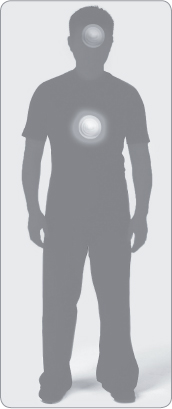
Strong Middle Dantian—caring, sensitive, and generous
Weak Upper Dantian—confused, disoriented, and gullible
Characteristic: This person is loving but mindless.
One night he comes home drunk and smelling of cheap perfume. She confronts him, and in his debilitated state he curses her protruding belly and hits her hard, knocking her to the floor. He leaves that night and never returns.
The young woman gives birth to a boy and becomes a doting mother who spoils her child with misguided permissiveness that she calls “unconditional love.” He grows up to become a wild, bratty child who runs around screaming in public places and bullying other kids. She lets him do what he wants, dismissing his rowdiness as “cute.”
Her worst nightmare comes true as the boy grows into a man with an uncontrollable violent streak, develops an appetite for alcohol, and lacks a sense of proper boundaries and respect for women, just like his father. After he ends up in jail for assaulting his girlfriend, she wonders incredulously, how could this have happened?
This dantian combination—big heart; small head—generates a mixture of good intentions and poor judgment that invites chaos and confusion into a situation. This type of person ends up repeating the same mistakes over and over again, usually in the name of love, and always hopes for a different result each time. But love is not a substitute for wisdom, and when we lack the lead of our intuition and simply rely on our heart to guide us, we can end up making mindless choices and bad decisions. And then, just like the young woman in the story, we end up thoughtlessly weaving our own web of destruction. The list of attributes of the witless heart includes wishful thinking, naïve sentimentalism, and idiot compassion, which all lead to the same address: disaster.
In the next dantian scenario we will examine Type 4, which consists of a strong Middle Dantian and a weak Lower Dantian.
Type 4
Strong Middle Dantian and Weak Lower Dantian
Meet the kind school assistant librarian who has been toiling at the same thankless job for the last five decades. She attended that same school when she was a teenager, though at the time she dreamed of becoming a singer. At the talent show one year she sang so beautifully it brought tears to everyone’s eyes. But her parents discouraged her from pursuing her “impractical,” childish dream. After she graduated from high school, she remained on site as the assistant librarian, never expecting that she’d still be there so many years later.
Although she is by far the most senior faculty member, no one else on staff takes her seriously. Even the students mock her as she pushes the book cart along and rummages through the bookshelves, lost in a daydream while humming old songs to herself.
In her daydream fantasy she is young once again and bursts into the school principal’s office to announce that she is quitting her job to pursue a singing career. Then she sees herself on stage singing, and that’s when she hums those old songs. These are the only times she ever feels truly alive.
The assistant librarian has played out this fantasy daily for the last fifty years, bursting in unannounced on a dozen different principals and quitting her job countless times with each one. But she missed her chance to make her dream come true long ago, and the weight of that dispiriting knowledge makes her the sad, weary old woman she has become.
The last day before her retirement, the school throws a party in her honor. The assistant librarian is asked to make a parting speech on the same stage where she sang so many years ago. Halfway through, she stops, and with uncharacteristic feistiness offers to sing a song instead of reading more words. By the time she finishes, the audience is up on their feet, clapping and cheering her on enthusiastically.
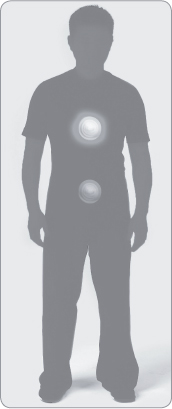
Strong Middle Dantian—caring, sensitive, and generous
Weak Lower Dantian—impotent, helpless, and weak
Characteristic: This person is loving but devitalized.
The next day, as the assistant librarian boxes up her belongings, a young student knocks on her office door to tell her how beautiful her voice is. She announces self-assuredly that she is also a singer, and that when she graduates she intends to pursue her dream of becoming a Broadway star. The assistant librarian wishes the young girl good luck and continues to clear out her belongings. Then she wonders how differently her life might have played out if she had ventured out into the world and courageously followed her heart …
People of this dantian type are extremely sensitive and easily intimidated by the harshness of the “real world.” Though warm and loving, they lack the guts to pursue their heart’s desires and often compromise their ambitions, settling for a safe choice and retreating into an imagined fantasy world that is more palatable than the actual one they inhabit. They are often nice, likable people, like the assistant librarian, who exude an aura of sweetness, but they easily get stuck in unsavory situations for a long time—even their entire lifetime.
Why do these good-hearted people tend to get trapped in unfulfilling situations? The combination of a big heart and no guts favors that outcome. Their sad stories invite our sympathy and compassion, but let us also acknowledge the energetic imbalance responsible in large part for their imbalanced lives. The root cause of their sad, unaccomplished lot ultimately lies within. The bane of their existence is a feeble vitality.
In the next dantian scenario we will examine Type 5, which consists of a strong Lower Dantian and a weak Upper Dantian.
Type 5
Strong Lower Dantian and Weak Upper Dantian
It is wartime, just before dusk. An inexperienced but charismatic officer gathers his troops. The battle-weary soldiers form a circle around him. He tells them that they have fought bravely today, but that the day is not over yet. There remains one last hill left to capture before they can rest.
The soldiers are physically exhausted, low on supplies and ammunition, and fatigued, but the officer delivers a rousing, stirring, patriotic speech. His passionate rhetoric hypes up the soldiers and by the time he is done they are ready to fight again.
The troops charge the hill with fiery courage, but it is a poorly planned, harebrained attack. Despite their bravery, all the soldiers, including the officer, are dead within minutes—all, that is, except for one who manages to escape with a flesh wound.
After the war ends the deceased officer is awarded a medal posthumously for his bravery on the battlefield, and the wounded soldier is asked to accept it on his behalf. To the shock of his superior, he refuses. They ask him for an explanation. He tells them that in his estimation the officer was not a hero. On the contrary, he sent good men—his friends—to their death needlessly, and he himself died in vain. His raw courage was devoid of wisdom. The decision to attack that night was inept, and the horrible results reflected the officer’s poor judgment and bad timing. Hero? He shakes his head. “At best, he was a brash fool.”
This dantian type—all guts and no brains—likes to “shoot first” and think later, if at all. This is a formula that will get you in trouble, sooner rather than later. Gutsiness is praiseworthy, but mindless action is costly, even lethal.
In the business world we encounter this type in the investor who impulsively bets his savings on a risky business venture. We encounter it in the womanizer who gets the girl pregnant carelessly in the heat of the moment. A surplus of hormones and a shortage of wisdom create the conditions for impulsive decision making that’s guaranteed to lead to “confident mistakes.”

Strong Lower Dantian—gutsy, dynamic, and charismatic
Weak Upper Dantian—confused, disoriented, and gullible
Characteristic: This person is vital but mindless.
This dantian type leaves behind a trail of messy footprints, some of them bloody. Like a child playing with a loaded gun, the potential destructiveness of mindless action can be devastating. Ironically, however, the most dangerous enemy this type will ever confront is seen each time he or she looks in the mirror.
In the next dantian scenario we will examine Type 6, which consists of a strong Lower Dantian and a weak Middle Dantian.
Strong Lower Dantian and Weak Middle Dantian
An old homeless woman approaches a high-powered attorney on the street on his way to the courthouse. She is hungry, tired, and cold, and her features remind him of his mother. The two make eye contact. She asks him for spare change in a frail voice. She holds a tin cup in her wrinkled, shaking hand. He feels a contraction in the middle of his chest, followed by a pang of anger that causes him to shake his head spitefully and move on.
The lawyer arrives in court and aggressively defends a client who he knows is guilty. Still, he manages to get the charge dropped on a technicality. On the way out, he makes eye contact with the defendant who was wronged. He feels the same hardening of his chest and walks away, proud of his “victory.” Later that day he receives an urgent phone call from his wife. His mother has suffered a heart attack. She is now hospitalized and in intensive care. Annoyed by the timing of the call, he checks his schedule and tells his wife he’ll do his best to get to the hospital after his next meeting. He spends half an hour at the hospital, mainly talking to the doctor to get the facts about his mother’s chances of recovery. Then he spends only a few minutes at her bedside. Despite the seriousness of his mother’s condition, he feels no emotion; instead his mind drifts to work-related issues.

Strong Lower Dantian—gutsy, dynamic, and charismatic
Weak Middle Dantian—lonely, rejected, and unfulfilled
Characteristic: This person is vital but heartless.
The next day on his way to the courthouse he gets another call informing him that his mother has died. Numbly, he hangs up. Just then, that same homeless woman approaches him with her tin cup and shakes it at him. He takes a step away, but then stops and turns back. He reaches into his pocket and drops a quarter into the cup before continuing on his way. Through this one measly act he expresses the deepest sentiment he can muster to mourn his mother’s passing.
Type 6 is a ruthless combination. A contracted Middle Dantian leaves us emotionally numb. Whenever a situation arises that calls for love or compassion, this individual tends to respond with bitterness and resentment. And an expanded Lower Dantian amplifies one’s self-confidence and ambition. This dantian combination is able to justify the most low-minded, selfish human behaviors.
On a mass level we may witness this dantian combination as heartless bureaucracy and pitiless oppression. On a smaller, more personal scale we may also see this type engaging in acts of heart-numbing selfishness at work, in friendships, or even toward your own mother, as exemplified by the attorney in our example.
A constricted heart that can’t experience love will always be the loneliest place in the world, and no amount of power or personal gain can change that fact. Eventually, even the most tyrannical dictator comes to realize that ultimately he is the biggest casualty of his own hardened heart.
The Seventh Dantian Type
Were you able to identify with any one of the six types? Were you able to identify the other five types with people you know? Your boss, father, best friend, or perhaps a favorite movie star? I hope that after reading through these examples you have now developed a more concrete understanding of how your own dantian imbalance sometimes throws your life into disarray.
Not everyone, however, can be ascribed to one of the previous six types. A small percentage of individuals exist whose Three Dantians are balanced and integrated, and whose lives are in an ongoing state of harmonious equilibrium all the time. These individuals cannot be reduced to a typology that describes various kinds of imbalances. Xiao Yao belonged to this category. I never detected any imbalance in my master’s energy field or in his life. The same steady, happy, balanced man enacted the roles of lowly boiler room attendant and senior monk at the monastery.
And in Xiao Yao’s presence, something odd happened to my own imbalances: they disappeared. Whenever I was confused or troubled by something, once I spent time with him in the boiler room I would leave illuminated with a clear, intuitive sense of what to do about it. If I was ever emotionally upset when I arrived, I would leave feeling content. If I arrived feeling weary and devitalized, I would leave feeling invigorated and enlivened.
Xiao Yao’s energy field had the same effect on other people who came into his presence too. He made them feel more balanced and integrated, and most incredibly, he didn’t have to say or do anything for that to happen. His aura was like a magic bubble that brought happiness to everyone who stepped inside it.
My master was a Type 7, which consists of three strong dantians that are evenly balanced and integrated.
Type 7
Three Strong Dantians
The spiritual master is in deep meditation when someone knocks on his door. He gets up and opens it. An old man stands outside, looking weary and haggard.
“How may I help you?” the master asks.
“May I come in?” the man responds.
“Please do.”
The master ushers him inside and bids the old man to sit on a cushion on the floor.
“Would you like some tea?”
“All right, thank you.”
The master offers the old man an aromatic cup of tea, and they both take a sip from their cups.
“I am here on my wife’s behalf,” the old man says, on the verge of tears. “She is ill.”
“If I can help to heal her, I will,” the master replies.
“But we are poor and can’t afford to pay you.”
“There is no need for you to worry about that,” the master reassures him.
“She is bedridden, and so she can’t come to you.”
“Then I will go to her.”
“Tonight?”
“Thank you,” the old man says, wiping his eyes dry.
“Drink the tea,” the master replies. “It will make you feel better.”
As they sip more tea in silence, the master continues to meditate, but with his eyes open. He fills his Three Dantians with Qi and radiates it into the old man’s energy field. He continues to do this until both their teacups are empty.
“I feel much better,” the old man says, now looking invigorated.
“This is a special tea,” the master says with a tender smile. “And now we shall get going to see your wife.”
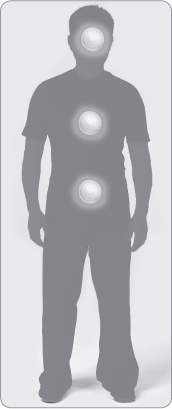
Strongest: All three dantians
Upper Dantian—intuitive, visionary, and insightful
Middle Dantian—caring, sensitive, and generous
Lower Dantian—gutsy, dynamic, and charismatic
Weakest: None
Characteristic: This person embodies wisdom, love, and vitality.
A Type 7 person embodies the balanced integration of wisdom, love, and vitality. In ancient traditional cultures such individuals were known as spiritual masters. Today we might refer to such an individual as someone who is balanced, integrated, or self-actualized.
Type 7 is the spiritual type—and I’d like to stress that the term “spiritual” doesn’t necessarily have a religious connotation. Our criterion for spirituality is based on the energetic condition of our Three Dantians, not on morality or affiliation with any organization. In this sense, both religious and secular people are spiritual if they embody a balanced integration of the Three Dantians, and both religious and secular people lack spirituality to the degree that they do not.
To be doubly clear, from here on the term “spiritual” will refer to the balanced integration of the Three Dantians. “Spiritual practice” will refer to any practical means that can help us achieve that goal, and the title “spiritual master” will refer to any individual who embodies that harmonious condition.
With those definitions out of the way, let me now ask you a question: How would you like to become more spiritual? In fact, each one of us can transform from any of the first six types into a Type 7. In the next chapter I will show you how to initiate that transformation by empowering the fourth Golden Wheel, the Central Meridian.
Brace yourself; the next leg of our journey will literally change the shape of your life!